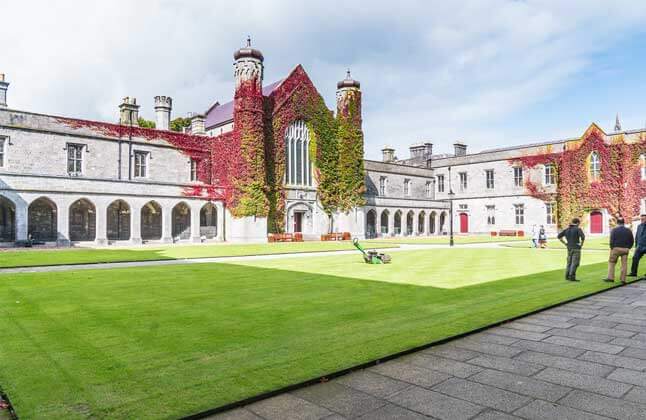Why do so many international students choose Ireland for their higher education?
Ranked fourth in Europe for quality education by the Organisation for Economic Co-operation and Development (OECD), Ireland is not only academically excellent but also culturally rich. No wonder that Indian students find it a highly suitable destination—second only to the USA and Canada.
Studying in Ireland is no longer only about getting a degree. It is about growing in a setting that values both educational and personal development.
Ireland’s educational focus is evident in its statistics. As of 2022, over 54% of adults in Ireland had achieved tertiary education. This makes Ireland 3rd in the list of OECD countries, on the basis of tertiary education.

The education landscape in Ireland is massively developed. But sometimes, even too many options are a problem. Students can feel overwhelmed with contradicting information about studying in Ireland. That’s why we’ve compiled this guide.
So, let’s get started.
Requirements for studying in Ireland
To study in Ireland, you’ll need to fulfill a few key requirements. Let’s break these down.
Academic requirements
If you’re considering Ireland for higher studies, you should be familiar with the Irish National Framework of Qualification (NFQ).
- It is a 10-level system that benchmarks and recognizes qualifications from Ireland and across the globe
- It is compatible with the European Network of Information Centres and the National Academic Recognition Information Centres
- It ensures the quality of education you receive is top-notch, regardless of where you choose to study
Why is this important?
This means that your academic qualifications from Ireland are recognized not just throughout Europe but also in major countries like the USA, Canada, Australia, and New Zealand.
Here’s what you need to know about specific requirements to study in Ireland:
- To enroll in an undergraduate program, you generally need a minimum academic score of 60% in Standard XII.
- If you’re aiming for diploma programs, the entry threshold is slightly lower, with required scores around 50% in XII.
- For postgraduate studies, you must have completed a bachelor’s degree.
- You’ll often be required to submit a portfolio for fields like art, design, or architecture.
While the entry requirements may seem lower than those in some other countries, the academic standards within Irish educational institutions are extremely high.
You’ll need to be prepared to meet rigorous educational demands, so strong academic skills and a good work ethic are essential.
Legal Requirements
If you’re coming to Ireland to study and your course lasts over three months, you must secure a residence permit.
As a non-EU/EEA student, the first step after you arrive in Ireland is to register with the Irish Naturalisation and Immigration Service (INIS) and obtain your Irish Residence Permit (IRP), which allows you to stay and study in Ireland legally.
When you land in Ireland, make sure you have your passport, proof of enrollment, proof of tuition fees paid, and medical insurance documents.
Once you’ve arrived and settled in, visit the nearest immigration office to finalize your registration for the IRP. Be prepared to provide biometric information and any other documentation they may need.
Visa criteria
As a non-EU/EEA student, you’ll be required to apply for a specific type of visa depending on the length of your study program in Ireland:
- Less than 3 Months: You need to apply for a C-type Irish study visa. This is generally for short courses or semester exchanges.
- More than 3 Months: You must apply for a D-type Irish study visa. This is required for full academic programs like an entire academic year or longer degree courses.
Here are some documents you will require for a visa application to study in Ireland:
- A format acceptance letter from a recognized Irish institution with your course of study (Note: You don’t need to submit an acceptance letter if you’re applying for a C-type visa, which lasts for less than months.)
- Proof of English Proficiency test (IELTS, TOEFL, or PTE score)
- Proof of tuition fees paid for your course
- Proof of finances
- Courses Longer Than 3 Months:
- You must prove you have immediate access to at least €10,000 to cover the estimated living costs for the first year.
- You also need to show you have access to an additional €10,000 for each subsequent year of study, along with the tuition fees for those years.
- Courses 3 Months or Less:
- You must demonstrate access to €700 for each month of your stay, or €4,200 in total, whichever is less.
- Additional Notes:
- The €10,000 requirement for longer courses applies to all academic programs starting after July 1, 2023.
- The funds can be your own or come from a sponsor.
- You’ll need to provide documentary evidence of your financial resources.If you have a sponsor, then proof that your sponsor can provide €10,000 for each year of your studies and cover tuition fees for those years
- Proof of private medical insurance
- A reasonable explanation for any gaps in your educational history
- A statement affirming that you intend to return to your home country after completing your studies in Ireland
Also read: A Complete Guide To Student Visa For Ireland
Language proficiency requirements
Since Ireland is an English-speaking country, demonstrating your proficiency in English is a crucial step in your application process, especially if you’re an international student.
You’ll need to take one of the recognized English language proficiency tests, such as IELTS, TOEFL, PTE, or the Duolingo English Test.
Many Irish universities do not require GRE or GMAT for admission to most of their courses. However, competitive programs like an MBA at prestigious institutions such as Trinity College Dublin or University College Dublin (UCD) may need it.
You should verify the specific requirements directly from the university’s admissions office.
Financial Requirements
One of the draws of studying in Ireland is its relatively affordable cost of living compared to other popular study destinations. However, as an international student, you need to show that you can financially support yourself while studying there.
Hence, the financial requirements include proof of at least €7,000 in your bank account to cover your initial year in Ireland. If someone is sponsoring your education, you will need to provide their bank statements from the last three months.
Health insurance requirements
As an international student in Ireland, you must have medical insurance. This is not just a formality; it’s a requirement because medical expenses in Ireland can be high, and the government does not cover medical bills for international students.
You must ensure that your health insurance policy covers at least €25,000, which is a little over ₹22 lakhs.
If you’re facing any difficulties, then you can look for help. Many universities in Ireland offer group health insurance policies for their international students.
If you find the process confusing or if you need further help, you can register with the Garda National Immigration Bureau for assistance on how to meet the health insurance requirements.
So, it’s clear that you’ll need to approach your application in a highly structured way, and will need to organize a lot of information/documents to apply successfully. The effort is worthwhile; here’s why.
Also Read: Study in Ireland Costs for an Indian Student
Benefits of Studying in Ireland
Studying in Ireland offers much more than just high-quality education. It’s a complete package that supports both your academic and career aspirations in many ways.
Let us see the advantages international students gain by studying in Ireland.
High-quality education
Ireland is recognized for its excellent economic system and government efficiency. It ranks third in Europe according to IDA Ireland for these factors..
What does this mean for you as a potential student?
It means that as a student in Ireland, you’re entering an education system that’s fostered by a number of government facilities and influenced by optimal economical performance.

Ireland is home to globally recognized institutions like Trinity College Dublin and University College Dublin. The Irish government actively supports these institutions by funding them and maintaining rigorous standards.
For you, this translates to receiving an education that is not only recognized globally but also backed by solid governmental support.
Rich academic and cultural heritage
In 2022, Irish universities saw a record enrollment of over 35,000 international students. This surge reflects the strong international presence in Irish universities.
Vibrant student life
According to the Higher Education Authority (HEA), international students comprised 14 percent of the total student population in the 2022/23 academic year. This is a significant increase from the preceding year’s figure of 12 percent.
Cities like Dublin, Galway, and Cork offer the perfect blend of cosmopolitan vibe and manageable size. These factors make your time in Ireland a deeply satisfying cultural experience.
Career opportunities
Ireland is a hub for many global tech giants such as Google, Meta, Microsoft, Apple, and Oracle. These companies offer abundant opportunities for students in software development, data analytics, cybersecurity, and IT.
Ireland is also a leading destination for pharmaceutical and biotech companies, boasting industry giants such as Pfizer, GSK, and Johnson & Johnson.
Of course, we recommend you check the placement record for the course/university you choose. Also, check the strength of the alumni network of the university.
Research opportunities
Students across disciplines receive funding support from key bodies like Science Foundation Ireland, the Irish Research Board, the Health Research Board, and IDA Ireland.
Universities like Trinity College Dublin and the National University of Ireland provide world-class research programs and help you collaborate with global partners and gain hands-on experience in various Industries.
Safety and quality of life
Ireland consistently ranks among the safest and most livable countries in the world. The Irish Council for International Students offers comprehensive support to international students in finding communities, living spaces, and part-time jobs.
English speaking
As English is the primary language spoken in Ireland, students from India and around the globe who study in Ireland find it easier to adapt and excel in their studies without any linguistic barriers.
Some Irish universities (for example, Ulster University) even offer English learning sessions for international students.
Stay-back visa options
If you want to stay back after your studies and build your career in Ireland, you can apply for generous stay-back visa options under the third-level graduate scheme.
This scheme allows graduates to remain in the country and seek employment post-study for up to 24 months.
Bachelor’s graduates can stay for one year, while Masters and PhD graduates can stay for up to two years, significantly enhancing their job prospects.
Pathway to permanent residency
Ireland offers a straightforward path to permanent residency, especially for those on the Critical Skills Employment Permit, highlighting its welcoming stance towards skilled individuals.
Also read: Why Study in Ireland: Top Reasons To Study Abroad in Ireland
Admission process
Research programs and universities
When planning to study abroad, the first thing you need to do is research the programs and universities you’re interested in.
Typically, the intake for new students starts in September and ends in December. So, it’s best to begin this process in your last year of high school or at least one year before you plan to start your studies.
Start by selecting the program you want to pursue. Once you’ve chosen a program, the next step is to choose a university that offers it. Consider factors like tuition fees, academic eligibility requirements, and necessary language test scores.
During this period, you should also start gathering documents like letters of recommendation and statements of purpose and preparing for language proficiency tests like the TOEFL or IELTS.
Meet the entry requirements
For most programs, you do not need a GRE score; however, always cross-check with the university’s official websites.
If you’re applying from a country where English is not the native language, you’ll need to demonstrate proficiency in English through exams like TOEFL, IELTS, etc.
Alongside this, start preparing your academic transcripts from high school or undergraduate studies, as these will be critical components of your application.
Apply to the university
For most undergraduate programs in Ireland, your application will be processed through the Central Applications Office (CAO). The CAO acts as the central body that manages applications based on the criteria set by Irish higher education institutions.
However, if you’re applying for a master’s degree, you don’t need to register with the CAO. You can directly apply through the official university site.
To apply via CAO, here’s how you can begin:
– Register on the CAO website. This account will be your hub for all application-related activities.
– You must submit English proficiency scores and upload scanned copies of your academic documents.
– Complete all the required fields with your personal information.
– Pay the application fee, which is approximately €45.
– If shortlisted, you may be invited to attend video interviews with the colleges.
– Once accepted, your next step will be to apply for your study visa.
If there are gaps in your educational journey, don’t worry. In Ireland, these are not seen as barriers to your education as long as you can explain what you did during that time—working or personal development.
The CAO application window typically opens in early November, with an early bird deadline in January and a final closing date in February for most courses.
Get an education loan
If you need funding to study in Ireland, start applying for educational loans from banks or international lender programs to cover your tuition fees. Once your loan is approved, the funds are usually sent to the university, and you will receive an acknowledgment letter.
Submit documents
Next, you’ll need to submit all necessary documentation. This includes your academic transcripts, English proficiency test scores, a personal statement or Statement of Purpose (SOP), and the tuition fee payment acknowledgment.
Application review and interview
After you’ve submitted your application, the response time can vary. It might take a few weeks up to a month to hear back.
If you receive an offer, remember you’ll have a limited time to accept it and confirm your intention to enroll. For undergraduate programs, the typical period for receiving responses is from July to August.
Acceptance and visa application
Once accepted, the next big step is applying for your study visa.
You must have an affidavit or bank statement to prove your financial stability and a health insurance coverage for the visa application to get accepted.
In case of a financial sponsor, be prepared to show their financial history through previous 3-months’ bank statement to prove their ability to support your education in Ireland.
Top courses to study in Ireland
Ireland is renowned for its high-quality education system, and here are some of the top courses that attract international students:
| Sr. No. | Course |
| 1 | Master of Business Administration (MBA) |
| 2 | Master of Finance |
| 3 | Master of Engineering |
| 4 | Master of Information Technology |
| 5 | Master of Software Development |
| 6 | Master of Medicine |
| 7 | Master of Pharmaceuticals |
| 8 | Master of Social Sciences |
| 9 | Master of Humanities |
Ireland offers some impeccable business programs with close ties to major European and global technology sectors.
Note: Universities that rank in the top 100 in the QS world ranking also offer these programs, like Trinity College Dublin. This university is often considered the best place to study engineering in Ireland.
Top universities to study in Ireland
Trinity College Dublin frequently headlines due to its high global ranking. However, according to the QS World University Ranking Report, several other major universities in Ireland also hold prestigious positions in world rankings.
They’re ranked in the order below:
| Sr no | University Name | Global Rank | Ireland’s Rank |
| 1 | Trinity College Dublin | 81 | 1 |
| 2 | University College Dublin (UCD) | 171 | 2 |
| 3 | National University of Ireland, Galway | 289 | 3 |
| 4 | Cork Institute of Technology | 292 | 4 |
| 5 | University of Limerick | 426 | 5 |
However, selecting the right university involves much more than comparing rankings. You must consider factors such as the courses offered, faculty expertise, campus culture, support services, and career opportunities after graduation.
No wonder you feel swamped by the sheer volume of information and decisions. That’s why we suggest you try SelectRight.
With an extensive database of over 4,000 universities and 40,000 programs, SelectRight offers you a wealth of options that align with your academic background, interests, and career aspirations.
How it Works:
Set Up Your Profile
Provide some basic personal details and your educational history.
Outline Your Needs
Next, tell SelectRight what kind of program you’re looking for. Are you interested in a specific field of study? Is there a particular part of Ireland you wish to study in?
Get AI-Powered Matches
Based on your preferences and profile, SelectRight will match you with programs that fit your criteria.
Compare and Choose
Take your time reviewing the suggested matches. Look at what each program offers, consider the costs, check the rankings, and consider what matters most to you.
Talk to an Advisor
If you’re unsure about your choices or need more help, a SelectRight advisor can provide personalized advice and assist you with your applications.
Let’s get started finding the perfect program for you.

Cost of studying in Ireland
It’s cheaper and more affordable for Indian students to study in Ireland than in other places like the US, UK, and Canada.
That’s why we have segmented the educational costs and expenses into different categories.
| Description | Cost (INR) |
| Undergraduate | ₹9 lakhs – ₹28 lakhs for universities |
| Post Graduate | ₹9 lakhs – ₹13 lakhs for Institutes of Technology |
| MBA | ₹10 lakhs – ₹12 lakhs for colleges |
Here’s a further breakdown of additional or personal expenses that a student may incur to study in Ireland
- Accommodation – ₹3 lakhs – ₹6 lakhs
- Student Visa – ₹20,000 – ₹40,000
- Medical Insurance – ₹30,000 – ₹50,000
- Food – ₹2 lakhs – ₹3 lakhs
- Transportation – ₹1 lakh – ₹2 lakhs
- Books and Supplies – ₹50,000 – ₹1 lakh
- Mobile and Internet – ₹30,000 – ₹50,000
Also read: Cost of Studying in Ireland: Fees, living costs, visa costs and more
Scholarships to study in Ireland
For Indian students considering studying in Ireland, several scholarship opportunities are available to ease their financial burden.
These scholarships include:
| Scholarship Program | Amount | Amount Offered | Duration |
| Government of Ireland International Education Scholarships | 8 lakhs | Typically covers tuition, a stipend for living expenses | 1 academic year |
| Government of Ireland Postgraduate Scholarship Programme | 19 lakhs | Varies, often includes stipend, tuition fees, and research expenses | Up to 4 years (depending on the study level) |
| Irish Research Council for Humanities and Social Sciences (IRCHSS) Scholarships | 24 lakhs | Varies, generally includes a stipend and contributions towards fees | Typically 1-2 years, can extend depending on the program |
| Irish Aid funded Fellowship Training Programme | 20 lakhs | Accommodation, living costs, academic fees, Visa application fees, medical and travel insurance, economy flights to and from Ireland, and Irish residence permit fee | 1-year program |
| DIT Centenary Scholarship Programme | Varies | Merit-based, covers 50% of the total tuition fee | 1 academic year |
| Galway Mayo Institute of Technology Scholarships | Undergraduate Programmes – 8 lakhs
Postgraduate Programmes – 10 Lakhs |
Merit-based covers 15% of the total tuition fee | Duration of the course |
| Opportunities in Ireland for Ontario College Graduates | 19 lakhs | Varies, generally includes a stipend and contributions towards fees | 1-2 years |
| Postgraduate Fellowships: The Walsh Fellowships | 21 lakhs | Varies, generally includes a stipend and contributions towards fees | 2-4 years |
Among these options, the IRCHSS scholarships stand out as particularly noteworthy. These scholarships offer €10,000 per year in financial assistance to roughly 60 deserving students.
Education Loans for Ireland studies
Multiple loan options are available to cover your tuition fees, living expenses, and other study-related costs to study in Ireland from India.
Let us explore these options.
When it comes to studying in Ireland, securing the right financial assistance is crucial, and you definitely don’t want to leave anything to chance.
With so many options available, it’s understandable if you feel overwhelmed by the process.
That’s where FundRight can help.
FundRight helps you cut through the confusion. By comparing factors like interest rates, repayment terms, cosigner requirements, and disbursement duration, it helps you find the right education loan for your financial situation.
But there is more to what FundRight can do for you. It goes the extra mile with additional features to make the whole process smoother.
How FundRight works:
- Sign up and fill in your details about yourself and your educational plans.
- Get loan offers from India’s top 15 banks and NBFCs.
- Receive personalized guidance from a financial advisor at FundRight to negotiate better loan terms.
- Upload your documents through the platform.
- Get your loan sanctioned in as little as 10 working days.
Job Prospects in Ireland
Ireland boasts a vibrant economy with a growing job market. It is home to multiple top-notch MNCs, providing opportunities for domestic and international students after graduation.
Here’s what you need to know about job prospects in Ireland:
| Field | Jobs | Best Places to Study | Average Base Pay (INR/year) |
| Engineering and Technology | Mechanical, Electrical, Civil, and Software Engineering | Trinity College Dublin, University College Dublin, University College Cork, University of Limerick, Dublin City University | ₹47 lakhs per annum |
| Hospitality and Tourism | Tourist guide, hotel manager, restaurant manager and travel agent | Trinity College Dublin, University College Dublin, University of Galway, Dublin Institute of Technology (TU Dublin) | ₹30 lakhs per annum |
| Business & Finance | Investment banker, risk manager, accountant, and financial analyst. | Trinity Business School, UCD Michael Smurfit Business School, DCU Business School, Kemmy Business School, J.E. Cairnes School of Business & Economics, Cork University Business School | ₹41 lakhs per annum |
| Sales and Marketing | Sales and Marketing roles in the pharmaceutical, retail, and e-commerce sectors, sales and Marketing roles are abundant. | University College Dublin, University of Limerick, University of Galway, Dublin City University, Dublin Institute of Technology (TU Dublin), Waterford Institute of Technology (SETU), Maynooth University | ₹37 lakhs per annum |
| Healthcare and Medical | Nursing assistants and laboratory technicians with strong prospects in pharmaceuticals and medical devices. | Trinity College Dublin, University College Dublin, University College Cork, University of Limerick, University of Galway, Dublin City University, Dublin Institute of Technology (TU Dublin), Waterford Institute of Technology (SETU), Maynooth University, Royal College of Surgeons in Ireland | ₹50 lakhs per annum |
The job prospects look promising and can be a great launchpad for students who have graduated from these fields. However, you need a post-study work visa to get started.
Post-Study Work Permit in Ireland
When you finish your higher education in Ireland as a non-EU/EEA student, you can apply for a Stamp 1G visa. This visa allows you to work in Ireland for up to 24 months, giving you a fair amount of time to gain work experience and explore career opportunities.
However, to qualify for the Stamp 1G visa, you need to have completed a recognized degree or higher qualification from an Irish institution. You’ll also need to secure a job offer or employment contract to apply for the visa through the Graduate Scheme.
If you’re fortunate enough to land a job in a high-demand field, you might be eligible for a Critical Skills Employment Permit as well, which opens up the possibility of long-term residency in Ireland.
Cost of Living in Ireland
Understanding the cost of living is crucial as you plan your higher education in Ireland. By knowing exactly what expenses to expect, you can budget effectively and ensure you are not overburdened with financial instability as a student.
Here’s a detailed breakdown of what you can expect:
Accommodation:
- Rent: Average rent prices range from ₹36,500 to ₹1,24,500 per month.
- Utilities: Additional expenses include electricity (₹4,100 to ₹8,300 per month), heating (₹4,100 to ₹8,300 per month), water (₹1,700 to ₹4,100 per month), and internet (₹2,500 to ₹4,100 per month).
Transportation:
- Monthly transport passes typically cost between ₹180 to ₹14,400.
Other expenses:
- Food: A student can expect to spend approximately ₹6,600 to ₹7,200 per month on food.
- Healthcare: Private health insurance can cost around ₹41,500 to ₹83,000 per year.
FAQs
1. What career opportunities are available after graduating in Ireland?
There are many companies in Ireland ranging from tech, pharma to finance and consulting groups. A fresher can easily get a job as a software engineer, sales executive, accountant into these companies. These opportunities are widely open for students in Ireland.
2. Can I explore Europe while studying in Ireland?
Ireland’s central location within Europe makes it a perfect base for exploring other countries. With a Schengen visa, you can travel to 26 European nations. Weekend trips or short breaks during semester breaks are a great way to experience the diversity of Europe.
3. What are the benefits of international students studying in Ireland?
Studying in Ireland gives you exposure to high-quality education with affordable tuition fees. You also get to refine your skills in strong research facilities, have global connections in its vibrant cultural diversity, and endless job opportunities after graduating. The bonus benefit is a 2-year post study work visa which gives you the lenience to work and even try getting a permanent citizenship.
4. Can I stay in Ireland after studying?
You can stay in Ireland after studying, provided you have a Stamp 1G visa under the graduate scheme.
5. Can you study English in Ireland as a different subject?
You can study English in Ireland in courses like Masters of Arts or Literature.
6. How many years gap is acceptable for study in Ireland?
While specific requirements may vary by institution, most universities in Ireland accept students with reasonable gaps in education.
7. Do I need a visa to study in Ireland?
Yes, international students require a student visa to study in Ireland. The application process involves submitting necessary documents, including proof of acceptance into a recognized Irish educational institution, financial stability, and health insurance.
8. Can I stay in Ireland after completing my studies?
After completing your studies, you can apply for a post-study work permit. This permit allows you to remain in Ireland temporarily to seek employment related to your field of study.

















